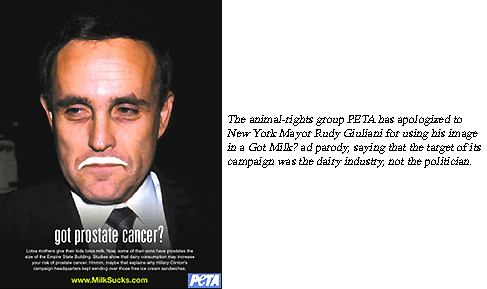PETA apologizes for Got Milk? parody

The animal-rights group that used an image of New York Mayor Rudy Giuliani in a Got Milk? ad campaign parody has apologized to the politician in addition to pulling the spots.
People for the Ethical Treatment of Animals issued the apology Sept. 1, stating that the target of the advertisements wasn't the mayor but the dairy industry.
The group had previously placed two mock Got Milk? ads in Wisconsin showing the mayor with a milk mustache and the query, "Got Prostate Cancer?" with text indicating that studies have shown a link between the disease and dairy consumption. (See related article).
Giuliani, who has been diagnosed with prostate cancer, criticized PETA and had threatened to sue the group.

"The ad was designed as an attack on milk, specifically on the plight of veal calves, their ‘dairy cow' mothers, and the ill-health effects of drinking milk," PETA leaders said. "The ad honestly wasn't an attack on the mayor, but a lot of people took it that way.
"Our goal was to get people to stop lamenting and start preventing, not to think: ‘If the mayor can get prostate cancer, there's no hope for me,' but to think, ‘Perhaps there are ways I might avoid this disease,' " the group said.
In a letter to Guiliani, PETA President Ingrid Newkirk states that "we hope you will accept our apology for any distress that PETA's recent billboard campaign may have caused you."
Newkirk also states that PETA won't sue the companies that took down the ad in an apparent violation of the organization's contracts with those parties. PETA had previously threatened to file suit against a Wisconsin ad company for taking the ads off billboards without the group's permission.
National Dairy Council and National Fluid Milk Processor leaders have labeled the ad "completely tasteless and insensitive."
Earlier this week, PETA spokesman Bruce Friedrich said the ads would be removed because the organization failed to gain the mayor's permission to utilize his image.
In early June, a study by a team of British researchers concluded that entirely avoiding consuming dairy products as well as meat might decrease men's risk of contracting prostate cancer. Scientists from the Imperial Cancer Research Fund, which conducted the research, did recommend, however, that additional research be conducted into the apparent connection. (See related article).
In April, a U.S. study was released indicating that men consuming dairy-rich diets might face increased risk of suffering prostate cancer.
The research, presented at the American Assn. for Cancer Research's annual meeting, indicates that a "moderate elevation" in prostate cancer risk is linked to ingesting "higher intakes" of dairy products and dairy calcium.
In addition, males drinking more than six glasses of milk weekly experienced lower levels of the "potentially protective" form of vitamin D vs. men drinking less than two glass a week.
Again, scientists were cautious about claiming a direct, unquestionable link, stating that more research is needed to confirm the findings. (See related article).
PETA cites the results of the Physicians' Health Study in asserting a link between dairy consumption and prostate cancer. The study of 20,885 physicians determined that men consuming a minimum of 2.5 servings of dairy foods daily were roughly 30% more likely to develop the disease vs. men whose average daily dairy consumption was less than half a serving.
But NDC and NFMP leaders argued that those test results aren't conclusive.
"(The study), which PETA uses as the backbone for its allegations about milk and prostate cancer, is a very preliminary ‘observational' study, which does not show a cause-and-effect relationship," the groups' leaders said. "The authors specifically caution within the text of the study that men should not eat less dairy or drink less milk. In fact, the authors clearly state that more research is needed to confirm their findings."
Edited by Gerry Clark
